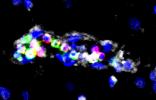Researchers at the National Institutes of Health found evidence that specific immune cells may play a key role in the devastating effects of cerebral malaria, a severe form of malaria that mainly affects young children.
Press Releases


National Institutes of Health Director Francis S. Collins, M.D., Ph.D., announced today the selection of John J. Ngai, Ph.D., as director of the NIH’s Brain Research through Advancing Innovative Neurotechnologies® (BRAIN) Initiative. Dr. Ngai is expected to join NIH in March.

New findings published in the Journal of Clinical Investigation suggest that specific immune T cells from people with myalgic encephalomyelitis/chronic fatigue syndrome (ME/CFS) show disruptions in the way they produce energy.

There are three treatment options commonly used by doctors in the emergency room to treat patients with refractory status epilepticus, severe seizures that continue even after benzodiazepine medications, which are effective in controlling seizures in more than two-thirds of patients.

The Accelerating Medicines Partnership (AMP) program for Parkinson’s disease (PD) has launched a data portal to provide de-identified information collected from 4,298 PD patients and healthy controls to researchers working to develop effective therapies for the disease.

High levels of dietary salt can activate a pathway in the brain to cause cognitive impairment, according to a new study.

Scientists have been developing astounding new tools for exploring neural circuits that underlie brain function throughout the first five years of the National Institutes of Health’s Brain Research through Advancing Innovative Neurotechnologies® (BRAIN) Initiative. Now, the NIH has announced its continued support for these projects by funding over 180 new BRAIN Initiative awards, bringing the total 2019 budget for the program to more than $424 million.
With support from the National Institutes of Health’s Brain Research through Advancing Innovative Neurotechnologies® (BRAIN) Initiative, scientists are developing powerful new devices and technologies to monitor and regulate brain activity.

Using advanced imaging, researchers have uncovered new information regarding traumatic microbleeds, which appear as small, dark lesions on MRI scans after head injury but are typically too small to be detected on CT scans.

Between 1999 and 2017, the United States experienced a 10-fold increase in the number of people who died from overdoses of Valium and other benzodiazepines. For years, scientists thought that these powerful sedatives, which are used to treat anxiety, muscle spasms, and sleeping disorders, worked alone to calm nerves.
